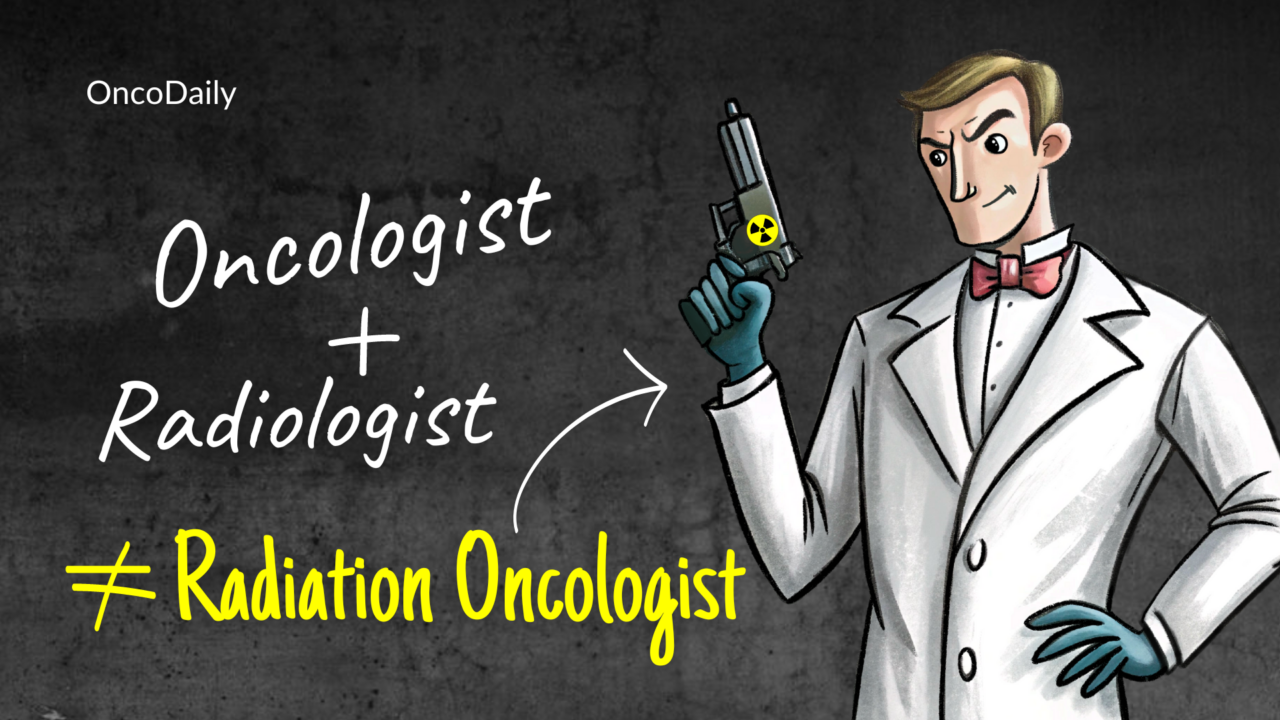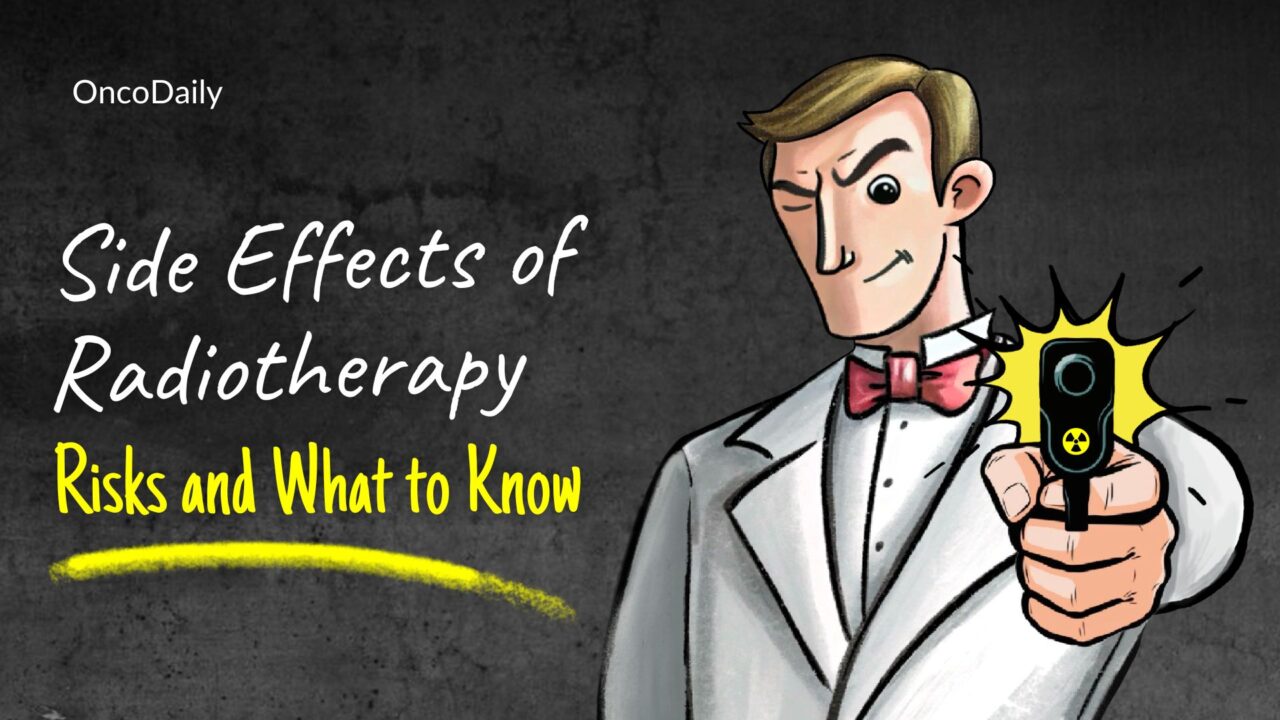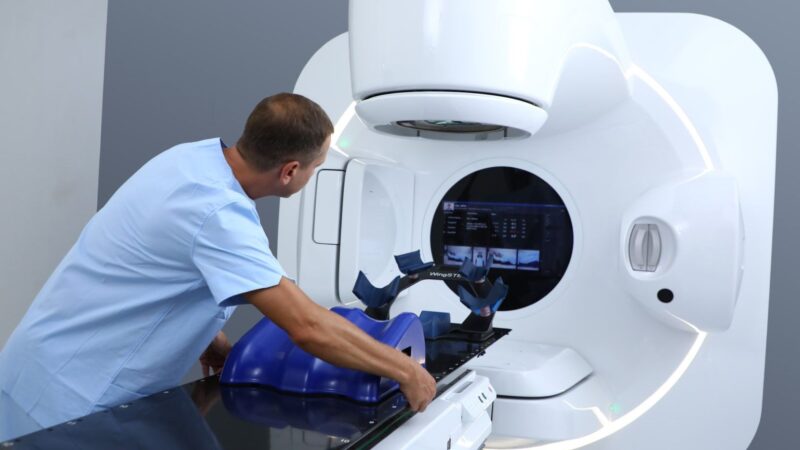Radiotherapy, while an effective treatment for various cancers, can lead to side effects that vary based on the treatment area, dose, and individual patient factors. Common risks include skin irritation, fatigue, and gastrointestinal issues like diarrhea, especially when treating pelvic cancers. Long-term effects may involve changes in organ function or tissue sensitivity. Understanding these risks and managing them with the guidance of healthcare providers can help patients navigate the treatment process more comfortably.
What is Radiotherapy?
Radiotherapy, also known as radiation therapy, is a medical treatment that uses high doses of radiation to destroy cancer cells. It works by targeting the DNA of cancer cells, preventing them from growing and dividing. While radiotherapy can also affect normal cells, cancer cells are more sensitive to radiation, and healthy cells are usually better at repairing the damage caused by it.
There are two main types of radiotherapy:
- External Beam Radiotherapy (EBRT): Radiation is delivered from outside the body using machines like linear accelerators and cobalt machines. The beams are carefully shaped and aimed at the tumor to minimize damage to surrounding healthy tissue.
- Internal Radiotherapy (Brachytherapy): Radioactive material is placed directly inside or near the tumor or in the tumor bed. This allows a high dose of radiation to target the cancer cells while limiting exposure to surrounding tissues.
Radiotherapy is commonly used to treat various types of cancer and can be used alone or in combination with other treatments such as surgery, chemotherapy, or immunotherapy. Depending on the type, size, and location of the cancer, radiotherapy may be used to:
- Cure cancer by destroying tumors.
- Shrink tumors before surgery.
- Prevent recurrence after surgery.
- Relieve symptoms like pain in advanced-stage cancers (palliative care).
How Long After Radiotherapy Will I Feel Better?
The recovery time after radiotherapy can vary greatly between individuals. Many patients start to feel better within a few weeks after their treatment ends, with side effects such as nausea and mild fatigue typically improving during this time. However, some side effects, like fatigue, skin irritation, or changes in appetite, may persist for a few months before fully subsiding. Factors such as your overall health, the area treated, the type and intensity of radiation, and any pre-existing conditions can all influence how long it takes to recover. For instance, fatigue may linger longer for some individuals, while others may experience more immediate relief. It’s important to follow up with your healthcare team to monitor your progress and address any ongoing symptoms. Your doctor may provide guidance on managing side effects and suggest strategies to help speed up recovery, including lifestyle modifications like rest, diet, and gentle physical activity.
Why Does Radiotherapy Cause Side Effects?
Radiotherapy causes side effects because it targets not only cancer cells but also healthy cells in the treatment area, especially those that divide rapidly, such as skin and gastrointestinal lining. While the goal is to minimize damage to normal tissues, some collateral effects occur as a result of radiation exposure. These side effects can vary depending on the treatment site, radiation dose, and individual sensitivity, often presenting as temporary or long-term changes in tissue and organ function.
Damage to Healthy Cells
Radiation is not perfectly selective. It targets the tumor but can also affect nearby healthy tissue, particularly in areas where cancer and normal tissue are closely connected. Healthy cells can repair themselves over time, but during treatment, they may be temporarily damaged, leading to side effects.
Accumulation of Radiation Dose
Side effects may increase over the course of treatment as radiation accumulates in the body. While cancer cells are continuously being damaged, healthy cells are exposed to radiation repeatedly, which can worsen side effects over time, particularly fatigue and skin reactions.
Healing and Recovery of Normal Cells
Healthy cells’ recovery process: While most healthy cells can recover after radiation exposure, the time it takes varies. Cells in areas such as the skin, lining of the digestive tract, and mouth are particularly sensitive because they naturally divide more quickly. The faster a tissue regenerates, the more likely it is to experience side effects during radiation therapy.
Radiation Sensitivity of Different Tissues
Tissue vulnerability: Different tissues in the body respond differently to radiation. For example, skin cells and cells lining the gastrointestinal tract are more sensitive to radiation, which is why side effects like skin irritation, nausea, or diarrhea are common. In contrast, organs such as the heart or lungs may not show side effects until long after treatment (late side effects).
Dose and Duration of Treatment
Higher doses, more side effects: The intensity and duration of radiotherapy also affect the likelihood and severity of side effects. Higher doses of radiation or longer treatment periods can increase the damage to both cancerous and normal cells. While healthy cells are better at repairing radiation damage, they can still cause temporary side effects during recovery, and in rare cases, permanent damage may occur, leading to long-term or late side effects.
Know Your Doctor, Read Special Article by OncoDaily on Who is a Radiation Oncologist?

What Are the Common Side Effects of Radiotherapy?
Radiation therapy can cause both early and late side effects. Early side effects, such as nausea and fatigue, typically occur during or shortly after treatment and improve within a few weeks. Late side effects may develop years later and can be more permanent, such as lung or heart problems.
Early side effects: These are short-term and can include fatigue and skin issues. They usually begin during treatment, peak near the end, and improve after therapy ends. Other side effects may vary based on the treatment area, such as hair loss and nausea.
Late side effects: These can appear months or years after treatment and may include serious issues like internal organ damage or, rarely, a second cancer.
Fatigue: The Most Common Side Effect
Fatigue is a common side effect of radiation therapy, starting after a few weeks and worsening as treatment progresses. Unlike regular tiredness, it doesn’t improve with rest and can be exhausting. It can interfere with daily activities and vary in intensity.
Managing fatigue:
- Take prescribed medications, stay active, rest when needed, and eat well.
- Consider counseling or energy conservation techniques.
- Prioritize tasks when feeling up to it and balance rest with activities.
- Seek support from family, friends, or your employer for work adjustments.
Fatigue usually improves within a few weeks after treatment ends, but inform your doctor if it’s persistent.
Skin Reactions: What to Expect
Skin reactions are common with external beam radiotherapy and often resemble sunburn. Initially, you may experience mild redness and dryness, which can worsen over time. As the skin becomes more sensitive, irritation and itching may occur, leading to discomfort. In some cases, the skin may peel or flake, similar to after sunburn, and moisturizing can help alleviate this. Severe reactions, such as burns and blistering, may occur in some individuals and require specialized care. To manage these reactions, it’s important to moisturize regularly with fragrance-free creams, avoid direct sunlight, and cover the treated areas. Wearing soft, loose clothing can help reduce friction and keep the skin comfortable.
When to seek medical advice: Contact your medical team if you experience severe burns, open blisters, or significant pain for proper care and treatment adjustments.
Gastrointestinal Issues: A Common Challenge
Diarrhea is a common side effect of radiotherapy, particularly when targeting the abdomen, pelvis, or stomach. It typically starts a few days after treatment begins and may intensify as therapy progresses. This occurs because radiation affects the cells that line the bowel, resulting in irritation and subsequent diarrhea.
Management
-
- Stay hydrated by drinking 8–12 cups of clear liquids daily. Water is best; avoid sugary drinks.
- Eat small meals and snacks rather than large meals.
- Increase intake of foods rich in salts like sodium and potassium (e.g., bananas, oranges, potatoes).
- Avoid alcohol, dairy, spicy foods, high-fiber foods, caffeine, and fried or greasy foods.
- Use baby wipes or water to clean the rectal area and consider sitz baths for comfort.
- Inform your care team about persistent diarrhea, and they may suggest medications like Imodium.
Nausea and Vomiting
Nausea and vomiting are common side effects of radiotherapy, particularly when the stomach, intestines, or certain parts of the brain are targeted. These symptoms can be more pronounced when radiation is combined with chemotherapy, as both treatments can contribute to nausea and vomiting.
Management
-
- Eat bland, easy-to-digest foods such as toast, gelatin, or apple juice.
- Try light snacks (e.g., crackers and juice) 1–2 hours before treatment, or have treatment on an empty stomach if that feels better.
- Eat small, slow meals and avoid foods that are too hot or cold.
- Talk to your doctor about medications to prevent nausea.
- Acupuncture might help; ask your care team about this option.
These strategies can help control symptoms and improve comfort during radiation therapy. Always communicate with your healthcare team if symptoms persist or worsen.
Respiratory Problems: Understanding Lung Issues
Lung damage, such as radiation pneumonitis, can occur when radiation affects the lungs. This condition can cause inflammation and breathing difficulties. In some cases, brain swelling (edema) can develop, leading to headaches. These headaches are typically managed with steroids and generally resolve after treatment.
Cardiovascular Risks: Damage to the Heart
Radiotherapy can lead to various cardiovascular complications, which may manifest in both the short and long term. Short-term effects include acute conditions like pericarditis, while long-term complications can involve an increased risk of coronary artery disease, heart failure, and other cardiac issues that may develop years after treatment.
Short-Term Complications
- Pericarditis: Inflammation of the pericardium, the tissue surrounding the heart, can occur weeks to months after treatment. Symptoms may include chest pain and fluid accumulation, known as pericardial effusion.
- Long-Term Complications (may appear years later)
- Congestive Heart Failure: Heart’s ability to pump blood efficiently declines over time.
- Coronary Artery Disease (CAD): Radiation-induced damage to the endothelial cells can increase the risk of atherosclerosis, potentially leading to heart attacks. The incidence of CAD in patients receiving high-dose radiation is significantly higher compared to the general population.
- Cardiomyopathy: Long-term myocardial injury often results in fibrosis, which can lead to heart dysfunction and, in some cases, severe heart failure. Symptoms of cardiomyopathy may take over a decade to develop, making early detection challenging.
- Valvular Heart Disease: Radiation can damage heart valves, with the cumulative incidence of valvular heart disease rising to 20% after 30 years in survivors of Hodgkin lymphoma. Common defects include mitral and aortic regurgitation, with stenosis typically developing decades after treatment.
- Conduction System Abnormalities: Issues like atrioventricular block and arrhythmias may occur, usually within two months post-treatment. The incidence of conduction abnormalities is about 5%. While some ECG changes may resolve over time, the risks of these issues remain elevated compared to pre-treatment levels.
When to Expect Side Effects?
Side effects from radiotherapy can appear at different times. Short-term effects like fatigue, skin irritation, or pericarditis often start during treatment or shortly after, lasting for weeks. Long-term effects, such as heart disease or cognitive decline, may take months or even years to develop, sometimes appearing decades after therapy ends. Monitoring for both short- and long-term complications is essential throughout and after treatment.
Immediate Onset Side Effects: What to Watch For
Radiotherapy can have immediate side effects, which typically occur shortly after the treatment or within a few days. These side effects are a result of the radiation interacting with healthy tissue surrounding the tumor, leading to temporary disruptions in normal cell function. While these effects are often short-term, they can impact a patient’s quality of life during treatment.
- Fatigue: Persistent tiredness that doesn’t improve with rest.
- Skin irritation: Redness, dryness, or peeling at the treatment site.
- Nausea and vomiting: Especially when treating the abdomen or digestive tract.
- Diarrhea: Common with radiation to the pelvic or abdominal area, caused by irritation of the bowels.
These effects generally improve a few weeks after treatment ends but should be closely monitored and managed.
Delayed Side Effects: Weeks or Months After Treatment
Delayed side effects of radiotherapy typically develop weeks or even months after treatment and may persist long after the treatment has ended. These side effects occur as the body continues to react to the radiation, which can cause long-term changes in the tissues affected by the therapy. While many of these effects are manageable, some may require ongoing care or lifestyle adjustments.
- Cognitive decline: Memory problems or difficulty concentrating, especially with brain radiation.
- Radiation pneumonitis: Inflammation of the lungs, causing cough or shortness of breath.
- Heart issues: Such as pericarditis or coronary artery disease from chest radiation.
- Nerve damage: Numbness or weakness in areas near treated nerves.
These side effects may persist or develop over time, requiring ongoing monitoring and care.
You Can Also Read More About Side Effects of Immunotherapy: Special Article by OncoDaily

How Long Do Side Effects of Radiotherapy Last?
The duration of radiotherapy side effects depends on the type and severity of the side effects. Short-term effects, such as fatigue, skin irritation, nausea, and diarrhea, often begin during treatment and typically improve within a few weeks after treatment ends. These effects are usually temporary and gradually subside as the body heals.
However, long-term effects can take months or even years to develop. These may include cognitive problems, heart or lung damage, nerve issues, or bowel complications. Some of these long-term effects can be permanent, and regular follow-up is important to manage any lasting or late-emerging symptoms.
Short-Term vs. Long-Term Side Effects
Short-term side effects of radiotherapy typically occur during treatment and for a few weeks afterward. These include fatigue, skin irritation (redness or dryness), nausea, and diarrhea, especially with abdominal or pelvic treatment. These effects usually improve or disappear within weeks after treatment as the body heals, but can impact daily life during treatment. Fatigue is common and may persist for some time, improving with rest and care.
Long-term side effects may develop months or even years after treatment, depending on the treated area, radiation dose, and organs involved. These can include cognitive decline (if the brain is treated), heart problems (if the chest is treated), lung damage, and nerve damage leading to numbness or weakness. Bowel or bladder issues may arise with abdominal or pelvic treatment. Some long-term effects can be permanent or require ongoing management to maintain quality of life.
Permanent Side Effects: Understanding the Risks
Permanent side effects from radiotherapy can have a significant impact on a patient’s long-term health and quality of life. These side effects may occur due to the damage inflicted on healthy tissues and organs during treatment. Understanding the risks associated with permanent side effects is crucial for patients and their healthcare providers
Cardiovascular Issues: Radiation targeting the chest area can result in long-term heart problems. Conditions such as coronary artery disease, cardiomyopathy, and arrhythmias may manifest years later. Ongoing monitoring is essential to manage these risks, which can lead to serious health complications.
Lung Damage: Patients receiving radiation to the chest are at risk for chronic lung conditions. Radiation pneumonitis and pulmonary fibrosis can develop over time, resulting in persistent respiratory issues. These conditions can severely affect lung function and overall health.
Nerve Damage: Radiation near peripheral nerves can lead to permanent neuropathy. Symptoms may include numbness, tingling, or weakness in affected areas, impacting mobility and daily activities. This nerve damage can significantly hinder quality of life and independence.
Bowel and Bladder Dysfunction: Radiation to the abdominal or pelvic regions can result in long-term gastrointestinal and urinary issues. Patients may experience chronic diarrhea, bladder irritation, or sexual dysfunction. These side effects can significantly affect personal and social aspects of life.
Secondary Cancers: Although rare, there is an increased risk of developing secondary malignancies as a result of radiotherapy. This risk is particularly concerning with higher radiation doses and specific treatment areas. Patients should be aware of this possibility and engage in regular screening and follow-up care.
How to Manage Common Side Effects?
Managing side effects during and after radiotherapy is an essential part of the treatment process. While some side effects are temporary and may resolve on their own, others can be managed with medical intervention and lifestyle adjustments. Effective management helps improve a patient’s quality of life during and after treatment.
Managing Severe Side Effects: What to Do?
Managing severe heart and neurological side effects from radiotherapy requires close monitoring and specialized care.
For heart complications like cardiomyopathy, coronary artery disease, and pericarditis, regular follow-ups with cardiologists, screenings such as echocardiograms, and medications like antihypertensive drugs are important. Lifestyle changes, such as a heart-healthy diet, exercise, and quitting smoking, can help reduce risks. Severe symptoms, like chest pain or shortness of breath, should prompt immediate medical attention. Cardiac rehabilitation can support recovery with structured exercise and education.
For neurological issues like cognitive decline or peripheral neuropathy, patients should report symptoms to their healthcare team. Neuropsychological assessments and therapies, such as cognitive and occupational therapy, can help manage daily tasks and improve function. Medications and physical therapy can ease pain and improve mobility.
Emotional support through counseling or support groups is also important for coping with these side effects. Regular communication with healthcare providers ensures timely care and helps maintain quality of life.
Radiotherapy vs. Chemotherapy Side Effects: A Comparison
Radiotherapy Side Effects
- Localized Impact: Radiotherapy typically targets a specific area of the body, leading to localized side effects. Common effects include skin irritation, fatigue, and organ-specific issues (e.g., diarrhea from abdominal radiation).
- Early Side Effects: These can occur during or shortly after treatment, such as skin burns, fatigue, and hair loss in the treatment area.
- Delayed Side Effects: Some side effects may manifest weeks or months later, including lung damage, cardiovascular issues, or secondary cancers, depending on the radiation dose and treated area.
Chemotherapy Side Effects
- Systemic Impact: Chemotherapy affects the entire body, targeting rapidly dividing cells, which can lead to widespread side effects.
- Common Side Effects: These include nausea, vomiting, hair loss, fatigue, and an increased risk of infections due to lowered white blood cell counts.
- Immediate to Delayed Effects: Side effects can occur during treatment, with some effects, like nerve damage or changes in organ function, potentially emerging months or years after therapy ends.

When Should You Contact a Doctor?
During radiotherapy, it’s important to monitor your health closely as side effects can sometimes indicate complications or require medical attention. Most side effects are temporary and can be managed with supportive care, but there are certain situations when you should contact your doctor immediately. If you experience persistent or severe discomfort, signs of infection, difficulty swallowing, unusual bleeding, or changes in bowel or urinary habits, it’s crucial to reach out to your healthcare provider. Additionally, if the side effects interfere significantly with your daily activities or if you notice any new or worsening symptoms, consult your doctor to discuss potential adjustments to your treatment plan.
You should contact a doctor if you experience any of the following:
- Severe Side Effects: Intense or worsening side effects, such as uncontrollable pain, nausea, vomiting, or extreme fatigue that interferes with daily activities.
- Signs of Infection: Development of fever, chills, or signs of infection (such as redness, swelling, or pus at the treatment site).
- Cardiovascular Symptoms: Symptoms like chest pain, shortness of breath, or palpitations that may indicate heart-related issues.
- Neurological Changes: New or worsening symptoms, including headaches, dizziness, confusion, or changes in vision or speech.
- Gastrointestinal Problems: Persistent diarrhea, constipation, or blood in your stool, which may indicate serious digestive issues.
- Skin Reactions: Severe skin irritation, blistering, or changes in the skin at the treatment site.
- Unexplained Weight Loss: Significant, unexplained weight loss or changes in appetite.
- Emotional Distress: Feelings of being overwhelmed, anxious, or depressed that affect your daily life.
- Long-Term Effects: New symptoms related to past radiotherapy or chemotherapy, such as changes in breathing, cognition, or bowel habits.
Maintaining open communication with your healthcare team is essential for managing side effects and addressing any concerns that arise during treatment and recovery.
FAQs
Can I eat normally during radiotherapy treatment?
Yes, most patients can eat normally during radiotherapy, but some may experience changes in appetite or specific dietary restrictions depending on the treatment area. It’s essential to maintain a balanced diet to support your health and recovery. If you encounter issues such as nausea, difficulty swallowing, or taste changes, consult your healthcare team for dietary recommendations or interventions.
Will radiotherapy affect my immune system?
Radiotherapy primarily targets cancer cells, but it can also affect nearby healthy tissues, including bone marrow, which produces blood cells critical for the immune system. While not all patients experience significant immune suppression, those receiving radiation to larger areas or in combination with chemotherapy may have a higher risk of infections. Regular monitoring and communication with your healthcare team can help manage any potential impacts on your immune system.
Is radiotherapy painful?
Radiotherapy itself is generally not painful. The treatment involves positioning you and delivering radiation, which typically feels similar to having an X-ray. However, some patients may experience discomfort related to skin irritation or side effects in the treatment area during or after the course of treatment. If you experience pain or discomfort, it’s important to discuss this with your healthcare team for appropriate management.
Why do side effects from radiotherapy occur?
Side effects happen because radiation can damage healthy cells near the treatment area. While cancer cells are more sensitive to radiation, surrounding normal tissues can also be affected, leading to side effects.
How can I manage side effects during radiotherapy?
Managing side effects involves staying hydrated, eating a balanced diet, and resting when needed. Topical creams may help with skin irritation, while medications can address nausea and other symptoms. Always talk to your healthcare team for personalized advice.
What are the common complications of radiotherapy ?
Common complications include skin burns, inflammation of the treated area, fatigue, and temporary or permanent damage to surrounding tissues or organs. Most of these are manageable with proper medical support.
How can I manage side effects during radiotherapy?
Managing side effects involves staying hydrated, eating a balanced diet, and resting when needed. Topical creams may help with skin irritation, while medications can address nausea and other symptoms. Always talk to your healthcare team for personalized advice.
Can radiotherapy affect fertility?
Yes, radiotherapy to areas near the reproductive organs can affect fertility. Your healthcare provider can discuss fertility preservation options before treatment if this is a concern.
How does radiotherapy differ from chemotherapy in terms of side effects?
Radiotherapy mainly affects the treatment area, leading to localized side effects like skin irritation or fatigue. Chemotherapy, on the other hand, can cause systemic side effects like hair loss, immune suppression, and nausea since it targets cancer cells throughout the body.
Will radiotherapy make me lose my hair?
Radiotherapy causes hair loss only in the treatment area. For instance, if you receive radiation to your head, hair loss may occur in that region, but it will not affect hair elsewhere on the body.
If You Want To Stay Updated From Latest Radiation Oncology Research You can Read Special Articles by Oncodaily on Major Radiation Oncology Conferances: ASTRO and ESTRO


Written by Aren Karapetyan, MD



